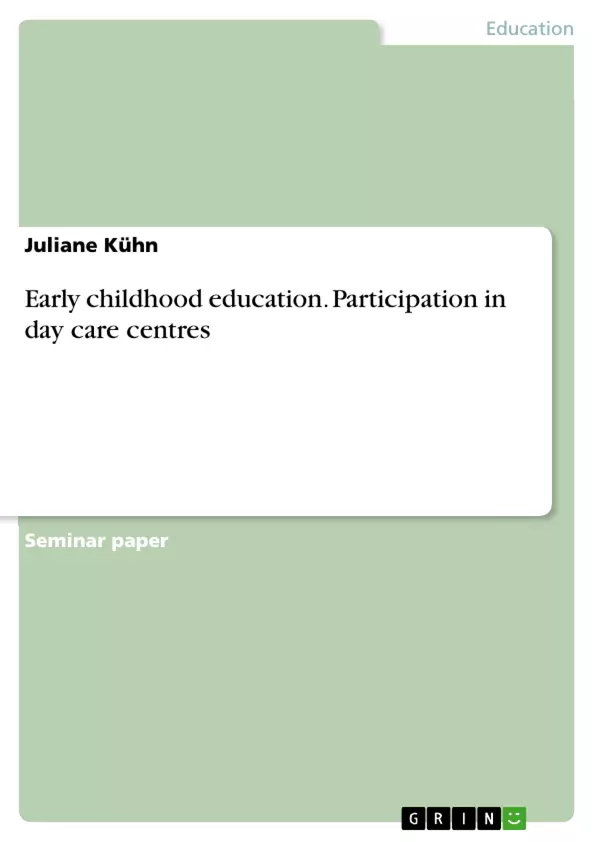Participation has become an increasingly relevant topic in politics and the media in recent years. In social institutions, there is more and more discussion on how addressees can be more involved in processes and how participation can be implemented in practice.
In the field of early childhood education, children should be allowed to actively shape their environment and have a say in relevant decisions that affect their everyday lives. In this context, it is often discussed to what extent children are already competent enough to be able to actively participate or how large the scope for participation can be. Do they not lack the experience and foresight of adults? What can participation in day care centres look like and where are the limits?
These questions will be addressed in this paper. First, the term 'participation' will be briefly defined and the legal basis will be described. Furthermore, the importance of participation for children will be explained.
In the next chapter, the view of man, the basic approach and the dialogue skills of the professionals in day care centres will be described as requirements for successful participation. The main part of the work is devoted to methods and examples of participation in day care centres. In the summary and in the outlook, the limits of participation are discussed.
The work is very practice-oriented and is intended to shed light on how participation can be implemented using the example of a day care centre. The aim of the work is to give an overview of the possibilities of participation in day care centres and to show why participation is so relevant for children.
Inhaltsverzeichnis (Table of Contents)
- Introduction
- Theoretical overview
- Definition of participation
- Legal regulations
- Relevance of participation for children
- Requirements for successful participation.
- View of man and basic approach
- Examples and methods of participation in day care centres for children.
- Participation in decision-making in everyday life.
- Children's Council/Children's Conference.
- Project
- Other methods
- Summary and outlook.
- limits
- summary
- prospect
Zielsetzung und Themenschwerpunkte (Objectives and Key Themes)
This paper aims to provide a comprehensive overview of the possibilities of participation in day-care centers and to explain why participation is so relevant for children. The paper focuses exclusively on the Federal Republic of Germany and the current cultural and legal conditions.
- Definition and legal framework of participation in early childhood education
- Importance of participation for children's development and democratic values
- Examples and methods of implementing participation in day-care centers
- Challenges and limitations of participation in day-care settings
- The role of pedagogical specialists in fostering participation
Zusammenfassung der Kapitel (Chapter Summaries)
- Introduction: This chapter introduces the topic of participation in early childhood education and highlights its growing relevance in both politics and social institutions. It raises key questions about the competence of children to participate, the design of participation spaces, and the limitations of participation in day-care centers.
- Theoretical Overview: This chapter delves into the definition of participation, tracing its evolution from political involvement to broader societal engagement. It discusses the legal framework underpinning children's right to participate, drawing on the German Basic Law and international conventions. The chapter emphasizes the importance of participation for children's development, highlighting its contributions to their social, emotional, and cognitive growth.
- Examples and Methods of Participation in Day Care Centres for Children: This chapter explores various methods and examples of participation in day-care centers. It examines how children can be involved in decision-making processes, including through Children's Councils, project-based learning, and other innovative approaches. The chapter aims to provide practical insights into the implementation of participatory practices in day-care settings.
Schlüsselwörter (Keywords)
This paper focuses on the key concepts of participation, early childhood education, child development, democracy, and legal frameworks. It explores how participatory practices can foster children's development and create inclusive and equitable learning environments in day-care centers.
Frequently Asked Questions
What is participation in early childhood education?
It means allowing children to actively shape their environment and have a say in decisions that affect their everyday lives in daycare centers.
Are children competent enough to participate?
Yes, the paper argues that children can participate according to their developmental stage, though they may lack the foresight of adults.
What are the legal foundations for child participation in Germany?
The right to participate is anchored in the German Basic Law (Grundgesetz) and international conventions like the UN Convention on the Rights of the Child.
What are methods of participation in day care?
Common methods include Children's Councils, Children's Conferences, and project-based learning where children decide on topics.
What is the role of pedagogical staff?
Specialists must have strong dialogue skills and a basic approach that views children as competent individuals capable of decision-making.
- Arbeit zitieren
- Juliane Kühn (Autor:in), 2014, Early childhood education. Participation in day care centres, München, GRIN Verlag, https://www.grin.com/document/1168537



